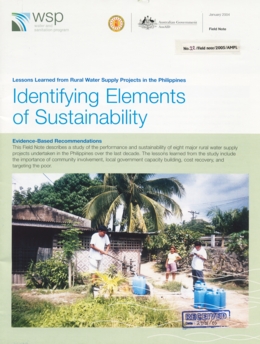|
 A flood of aid during the international decade for water supply and sanitation (1980-1989)failed to provide universal access to safe water for all Filipinos. At the end of the decade less than 5 percent of the planned systems remained in operation, forcing national attention on the issue of service sustainablity. In response, a new generation of rural water supply projects emerged during the 1990s. These included eight major donor-funded projects that experimented with new approaches to financing and implementation. In 2003 a study by the Water Supply and Sanitation Performance Enhancement Project (WPEP) assessed the sustainability and performance of these projects. A flood of aid during the international decade for water supply and sanitation (1980-1989)failed to provide universal access to safe water for all Filipinos. At the end of the decade less than 5 percent of the planned systems remained in operation, forcing national attention on the issue of service sustainablity. In response, a new generation of rural water supply projects emerged during the 1990s. These included eight major donor-funded projects that experimented with new approaches to financing and implementation. In 2003 a study by the Water Supply and Sanitation Performance Enhancement Project (WPEP) assessed the sustainability and performance of these projects. Overall, the findings of the study suggest that projects with significant investments in capacity and institution building produced the most sustainable rural water supply systems. It also showed unequiocally that the involvemnet of the local government and communities aids the preparation, planning, implementation, and management of such systems, and that sustainability is improved when these processes are monitored by external agencies. The study suggests that the success of projects will require strengthening local capacity and building institutions to operate and maintain systems, developing mechanisms for cost recovery, explicitly targeting the needs of the poor, and providing more incentives for local investment. The field note describes a study of the performance and sustainablity of eight major rural water supply projects undertaken in the Philippines over the last decade. The lessons learned from the study include the importance of community involvement, local government capacity building, cost recovery, and targeting the poor. Post Date : 17 Juni 2005 |